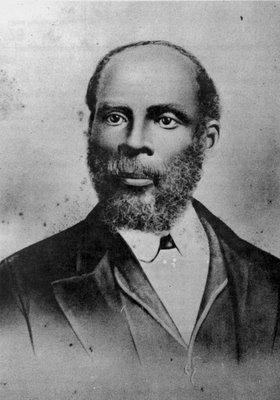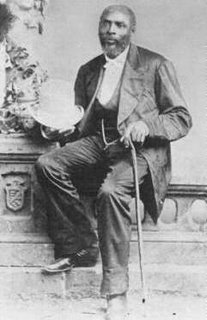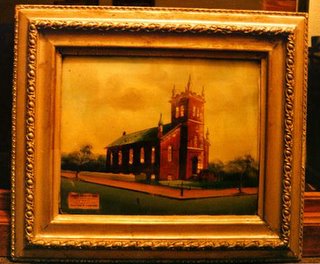 February is traditionally known as black history month. While some in our society unfortunately use it to play what has commonly become known as “the race card”, as believers in the Lord Jesus Christ, we can ‘redeem’ it by honoring one of the Lord’s servants.
February is traditionally known as black history month. While some in our society unfortunately use it to play what has commonly become known as “the race card”, as believers in the Lord Jesus Christ, we can ‘redeem’ it by honoring one of the Lord’s servants.
By God’s grace, all who are Christ’s were granted saving faith to salvation being reconciled to God through the once for all atoning sacrifice of Jesus Christ on the cross. And for that reason, He has also given us “the ministry of reconciliation” (proclaiming His gospel; urging all men everywhere to repent and follow Christ – 2 Cor. 5:17ff). Therefore, the powerful reality for the Christian, is that racism should not exist in the body of Christ. Why? God has chosen before the foundation of this world and marked out for Himself a people from every tribe, tongue, and nation. In the church beloved, “there is not Greek and Jew, circumcised and uncircumcised, barbarian nor Scythian, slave nor free; but Christ is all, and in all.” (Colossians 3:11). Amen? i would like to introduce you to the life and ministry of John Jasper (1812 – 1901).
.
-John Jasper, on genuine salvation must bear the fruit of a changed life.
“I have finished my work. I am waiting at the river, looking across for further orders.” -John Jasper’s last words.
John Jasper was born on July 4th in 1812. He was an African-American preacher, philosopher, and orator. He grew up in Fluvanna County, Virginia, the youngest of 24 children. He became a Christian on the July 4th 1839 in Capital Square of Richmond, Virginia. Tina, Jaspers mother – a godly woman, prayed that God would make her son a preacher as his father had been. For many years it seemed those prayers would not be answered. John had no interest in spiritual things. He had fallen in love with a girl from a neighboring plantation and been given permission to marry her. But on the day of their wedding, a slave uprising caused their masters to separate them, and John never saw her again. In bitterness he descended into evil living.
John was rebellious and constantly in trouble with his owners. It was while he was at work in a tobacco warehouse in 1839 that Jasper, stricken with “God’s arrow of conviction,” prayed and asked God to save him. Thirty days after his baptism in 1840, he was licensed to preach by the Old African Baptist Church, and he didn’t stop for more than sixty years!
“My sins was piled on me like mountains; my feet was sinking down to the regions of despair, and I felt that of all sinners I was the worst. I thought that I would die right then, and with what I supposed was my last breath I flung up to heaven a cry for mercy…”
He was baptized in 1849 and on the same day, he preached a funeral, which immediately brought him fame. He taught himself to read and write, and although he delivered his sermons in the dialect of the southern slave, more educated ministers said that Jasper’s vivid and dramatic sermons transcended “mere grammar.”
 One of the great Slave preachers, Jasper became a noted funeral preacher long before the Civil War. Noted for his fervid zeal, gifted imagery, and colorful oratory, as a speaker Jasper was much in demand. He preached in many sections of Virginia and adjoining states. During his August vacation, he conducted famous all-day camp meetings in the country. Sunday after Sunday he could be seen leading his flock to be baptized in the James River. He was known to have baptized as many as 300 people in four hours. He reached the height of his aspiration in 1867 when he organized the Sixth Mount Zion Baptist Church. He gained national distinction in 1878 when he first preached his famed “DE SUN DO MOVE” sermon, which he later delivered by invitation more than 250 times, and once before the entire Virginia General Assembly. This sermon was his effort to prove through biblical references that the sun revolves around the earth. Black men were not allowed to preach in regular churches in those days unless supervised by white ministers. But Jasper’s pointed and powerful messages soon drew a growing crowd, black and white, to hear him preach.
One of the great Slave preachers, Jasper became a noted funeral preacher long before the Civil War. Noted for his fervid zeal, gifted imagery, and colorful oratory, as a speaker Jasper was much in demand. He preached in many sections of Virginia and adjoining states. During his August vacation, he conducted famous all-day camp meetings in the country. Sunday after Sunday he could be seen leading his flock to be baptized in the James River. He was known to have baptized as many as 300 people in four hours. He reached the height of his aspiration in 1867 when he organized the Sixth Mount Zion Baptist Church. He gained national distinction in 1878 when he first preached his famed “DE SUN DO MOVE” sermon, which he later delivered by invitation more than 250 times, and once before the entire Virginia General Assembly. This sermon was his effort to prove through biblical references that the sun revolves around the earth. Black men were not allowed to preach in regular churches in those days unless supervised by white ministers. But Jasper’s pointed and powerful messages soon drew a growing crowd, black and white, to hear him preach.
The Third Baptist Church in Petersburg, Virginia asked Jasper to preach twice a month, and other churches noticed a decline in their attendance on those Sundays. During the closing days of the Civil War, Jasper was asked to preach to the Confederate soldiers in the hospitals around Richmond. When the war ended, Jasper continued to preach.
Life never proceeded smoothly for Jasper. In addition to the problems inherent in being a black man in the post-war South, he endured jealous colleagues, failed marriages, and worldwide ridicule of his religious beliefs. But, he persisted. More than that, he triumphed. His congregation had swelled into the thousands, more than one third of whom were white.
 In March of 1901, John Jasper preached to his congregation for the last time on the subject, “Ye Must Be Born Again.” He urged his people to prepare for death, which he knew was coming soon for him. At his funeral, Dr. Hatcher said, “Every motion of his was made to exalt the Lord of his life.” At his funeral, Reverend Hatcher delivered the eulogy, calling him “a prince of his tribe.” Jasper is buried at Woodland Cemetery in Richmond, which also is the final resting place of tennis great Arthur Ashe.
In March of 1901, John Jasper preached to his congregation for the last time on the subject, “Ye Must Be Born Again.” He urged his people to prepare for death, which he knew was coming soon for him. At his funeral, Dr. Hatcher said, “Every motion of his was made to exalt the Lord of his life.” At his funeral, Reverend Hatcher delivered the eulogy, calling him “a prince of his tribe.” Jasper is buried at Woodland Cemetery in Richmond, which also is the final resting place of tennis great Arthur Ashe.
In 1867 he founded the Sixth Mount Zion Baptist Church in Richmond. The church began with nine members. Fifteen years later there were more than 1,000 members, and at his death they numbered nearly 2,000. Sixth Mount Zion, the church he founded in 1867, is thriving today.
